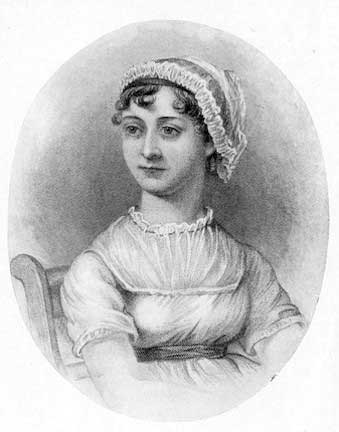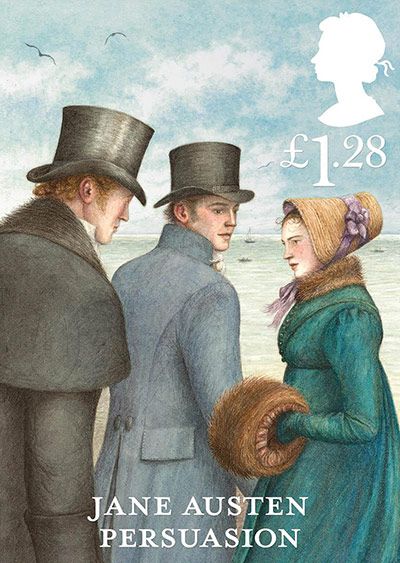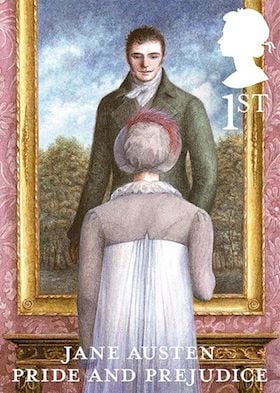Jane Austen’s Final Days — Her Illness, Courage, and Death
By Sarah Fanny Malden | On May 28, 2022 | Updated July 12, 2023 | Comments (0)

Jane Austen by Sarah Fanny Malden (1889) is a valuable resource on the life and work of the beloved British author from the perspective of the late 19th century. The following excerpt describes her final days —her illness, the courage she displayed, and her death.
Persuasion, the novel Jane Austen (1775 – 1817) was working on when she took ill, and Northanger Abbey (her first completed novel, still unpublished at the time of her death) were both published six months after her death in 1817.
There has been much speculation on the exact cause of her death, and the nature of her illness; but since no one can go back and prove one theory or another, that’s exactly what they remain — theories. You can explore some of these contemporary conjectures; take them all with a grain of salt:
- What Really Killed Jane Austen?
- New Evidence Suggests Jane Austen was Poisoned
- A New Twist on Jane Austen’s Illness
The 1889 publication of Malden’s Jane Austen was part of an Eminent Women series published by W.H. Allen & Co., London. The following excerpt is in the public domain.
Emma was the last work that Jane saw published
Emma was the last of her works that Jane Austen lived to see published; and despite the compliments, she received upon it, and the pleasure they gave her, its publication had sad associations for her.
Her brother, Henry Austen, had become ill while Jane was busy bringing out the novel, and it had been very sudden and serious. At first, Jane was alone with him, but, as the danger increased with alarming rapidity, she sent for the other members of the family.
They all arrived as quickly as was possible in those days when locomotion was so difficult; but Henry was at death’s door before they could get to him, and for many days he lay between life and death. He recovered eventually.
The strain and anxiety told much upon Jane, and she was still in a very low nervous state when fresh trouble came upon her family. Henry, who had tried several professions, and had been unable to establish himself in any, had for some time past been a partner in a bank, which now went broke. Many of the Austen family besides himself were involved in the loss.
. . . . . . . .

Learn more about Jane Austen
. . . . . . . .
Weakened health and spirits
Any family trouble was always deeply felt by Jane, and this came upon her when she was quite unfit for any fresh trial. Her health and spirits, which were already much weakened, sank perceptibly, and though she was anything but nervous about herself, and seldom mentioned her own health in her letters, she was evidently very far from well.
In 1816 one of her nieces had written to her with earnest inquiries after her health, in answer to which Jane replied,
“Many thanks for your kind care of my health. I certainly have not been well for many weeks, and about a week ago I was very poorly. I have had a good deal of fever at times and indifferent nights; but I am considerably better now, and am recovering my looks a little, which have been bad enough — black and white and every wrong colour. I must not depend upon being ever very blooming again. Sickness is a dangerous indulgence at my time of life.”
In the same making-the-best-of-it spirit, she wrote about this time to her brother Charles: ‘I live upstairs for the present and am coddled. I am the only one of the party who has been so silly, but a weak body must excuse weak nerves.’”
Increasing discomfort soon convinced her that she was not as near recovery as she had hoped, and though she was so cheerful before her family that they could not tell whether she was alarmed or not, before others she sometimes allowed herself to relax in this watchful self-control.
While staying with some old friends in scenes that were very familiar to her, they were struck by the way in which she spoke and acted as though she never expected to be there again, and the visible failure in her health greatly alarmed them.
Her letters, too, became sadder in tone, and in one of them the depression was so evident that she pulls herself up with the remark, “But I am getting too near complaint; it has been the appointment of God, however secondary causes may have operated.”
In the summer of 1816, she was able to pay a visit — which she must have known would be her last — to the old home at Steventon; and when she returned to Chawton, she continued to work at Persuasion, though under great difficulty from bodily weakness.
It may have been the consciousness of approaching death that touched that exquisite novel — the last she ever completed — with the wonderful pathetic sweetness and grace in which it stands alone among her works; even the happy termination having a sort of subdued radiance about it quite unlike the endings of her other stories.
Considering her state of health, it is wonderful that she could write at all. She had been obliged to give up all walking and almost all driving, while inside the house she could seldom find comfort or rest, except by lying down. The little drawing-room of Chawton Cottage contained only one sofa, which was appropriated to Mrs. Austen, then more than seventy years old, but if she had seen that her daughter needed it, she would, probably, have refused to use it herself.
Jane, who carried on all her work, literary or otherwise, amid all that was going on with her family, made herself a sort of couch with some chairs, and declared that she preferred this to the real sofa — a “pious fraud” which the grown-up members of the family respected in silence.
. . . . . . . .

Analysis and plot summary of Persuasion
. . . . . . . . .
Finishing Persuasion
In spite of weakness and suffering, she finished Persuasion in July, 1816; but when she attempted the most difficult part of the story — the re-engagement of Anne and Captain Wentworth — her brain had, for the moment, lost its full power, and she produced a chapter which was certainly not up to her usual standard.
Her clear judgment was not dimmed: she saw the deficiencies in what she had written, but, for the first time in her life, she felt incapable of correcting them, and a great wave of despondency swept over her as she realized her own weakness of mind and body, and felt that the pen which she had enjoyed the use of for so many years was at length slipping from her grasp.
Her despondency was, however, premature; she went to bed in very low spirits, but the next morning her brain was in full vigor again, and she resumed her pen with all the old energy. She now wrote two chapters in place of the one she had already composed, and as these give us the visit of the Musgroves to Bath; all the scenes immediately following that visit.
With the reconciliation of Anne and Captain Wentworth, her readers must feel that she has left us nothing worthier than her genius. She herself was quite contented with her second attempt, and indeed, it is difficult to see how she could have been otherwise.
. . . . . . . . .

Sanditon: An Unfinished Novel by Jane Austen
. . . . . . . . .
An improvement in health; the start of a new novel
For some time after this, she attempted no further writing, but in January 1817 she either was, or fancied herself, better, for she wrote to a friend, “I have certainly gained strength through the winter, and am not far from being well, and I think I understand my own case now so much better than I did as to be able to keep off any serious return of illness.”
And about the same time, she wrote to a niece, “I feel myself so much stronger than I was, and can so perfectly walk to Alton or back again without fatigue, that I hope to be able to do both when summer comes.”
Her hopes were never to be realized; but she took advantage of her comparative vigor to begin afresh novel on January 27th, 1817, and was able to go on with it, with tolerable rapidity, till March 17th.
This last unfinished attempt, which had not even received a title, has never been published, but extracts from it have been given, and a sketch of the plot as far as it was worked out. [Note: it’s likely that this refers to her unfinished novel, Sanditon.]
Hope begins to fade
It is possible that, if health had been granted her, Jane Austen would have polished and improved upon the materials until the characters had become as real to us as the Bertrams and the Bennets; but by this time her alarming state had become evident to every member of the family, and when two of James Austen’s daughters went to see her in April, the younger one recorded:
“She was then keeping to her room but said she would see us, and we went up to her. She was in her dressing-gown and was sitting quite like an invalid in an armchair, but she got up and kindly greeted us, and then, pointing to seats which had been arranged for us by the fire, she said, ‘There is a chair for the married lady and a little stool for you, Caroline.’
It is strange, but those trifling words were the last of hers that I can remember, for I retain no recollection of what was said by anyone in the conversation that ensued. I was struck by the alteration in herself.
She was very pale, her voice was weak and low, and there was about her a general appearance of debility and suffering, but I have been told that she never had such acute pain. She was not equal to the exertion of talking to us, and our visit to the sickroom was a very short one, Aunt Cassandra soon taking us away, I do not suppose we stayed a quarter of an hour, and I never saw Aunt Jane again.”
Still, she continued cheerful, though she can have had by this time little hope of recovery; and in April her brother James writes to his daughter that, “I was happy to have a good account of herself written by her own hand in a letter from your Aunt Jane, but all who love, and that is all who know her, must be anxious on her account.” By this time, she had given up her novel-writing, so that she must have felt herself weak indeed.
Awareness of her deteriorating state
In May she and her sister Cassandra moved into lodgings in Winchester that she might be within reach of an eminent medical man living there; but he had little hope of saving her, though, after going there, she seemed for a time rather stronger. She wrote touchingly to one of her nephews:
“I will only say further that my dearest sister, my tender, watchful, indefatigable nurse, has not been made ill by her exertions. As to what I owe her, and the anxious affection of all my beloved family on this occasion, I can only cry over it, and pray God to bless them more and more.”
She was now fully aware of her state and in no way alarmed by it, though — might she have chosen — she would gladly have lived longer. Every year was bringing her fresh fame and giving her new assurances of success; she was surrounded by loving relations and friends, and she had scarcely reached middle age.
Her brothers were scattered in their own various homes, but their children were a constant interest and pleasure to her, and she had the unceasing companionship of the sister who was more than anyone else to her, and from whom she had been so little separated.
Jane Austen’s last days
There was much to make life sweet to Jane Austen at the age of forty-two; nothing that should make her wish to leave it, and yet, with her usual contentedness, she quietly acquiesced in the summons for her, and endeavored, as far as possible, to cheer those around her.
Her sister-in-law, Mrs. James Austen, came to Winchester to help Cassandra with the nursing; and soon after she arrived, a sudden prostration in the patient made everyone believe that the end had come. Jane was aware of it, and, calm and serene as ever, said words of farewell to all who were with her.
Finally, she turned to her sister-in-law with warm expressions of gratitude for all her care and help, adding, “You have always been a kind sister to me, Mary.” The end was not as near as the watchers thought, for she lingered until past the middle of July, but when it came, it seemed sudden, as is often the case after a lingering illness.
On the 18th of July, 1817, Jane Austen breathed her last; and those who had watched her throughout her illness were thankful that the months of weariness and suffering were over, even though they felt how irreparable was their own loss.
. . . . . . . . . .

You may also enjoy:
Jane Austen’s First Attempts at Publishing
. . . . . . . . . .
Cassandra’s account of Jane’s death
Their feelings are best described in the letter which Cassandra wrote to her niece, Fanny Knight, two days after Jane had passed away; and this portion of the letter gives, also, the most complete account of her last hours:
“Since Tuesday evening, when her complaint returned, there was a visible change, she slept more and much more comfortably; indeed, during the last eight and forty hours, she was more asleep than awake. Her looks altered, and she fell away, but I perceived no material diminution of strength, and though I was then hopeless of recovery, I had no suspicion of how rapidly my loss was approaching.
I have lost a treasure, such a sister, such a friend as never can have been surpassed. She was the sun of my life, the gilder of every pleasure, the soother of every sorrow; I had not a thought concealed from her and feel as if I had lost a part of myself.
I loved her only too well—not better than she deserved, but I am conscious that my affection for her made me sometimes unjust to and negligent of others; and I can acknowledge, more than as a general principle, the justice of the Hand which has struck this blow …
I thank God that I was enabled to attend her to the last; and amongst my many causes of self-reproach, I have not to add any wilful neglect of her comfort.
She felt herself to be dying about half an hour before she became tranquil and apparently unconscious. During that half-hour was her struggle, poor soul! She said she could not tell us what she suffered, though she complained of little fixed pain.
When I asked her if there was anything she wanted, her answer was she wanted nothing but death, and some of her words were, ‘God grant me patience; pray for me, oh, pray for me.’ Her voice was affected, but as long as she spoke she was intelligible.
I hope I do not break your heart, my dearest Fanny, by these particulars; I mean to afford you gratification whilst I am relieving my own feelings.
… The last sad ceremony is to take place on Thursday morning; her dear remains are to be deposited in the Cathedral. It is a satisfaction to me to think they are to lie in a building she admired so much.”
A proper burial and fitting inscription
Jane Austen’s remains were laid near the middle of the north aisle of Winchester Cathedral, almost opposite the well-known tomb of William of Wykeham. The taste of the day was for full and somewhat minute epitaphs, and on a large slab of black marble which marks the spot was placed the following inscription:
“In memory of Jane Austen, youngest daughter of the late Revd. George Austen, formerly rector of Steventon in this County. She departed this life on July 18, 1817, aged 41, after a long illness, supported with the patience and hope of a Christian.
The benevolence of her heart the sweetness of her temper, and the extraordinary endowments of her mind obtained the regard of all who knew her and the warmest love of her immediate connections.
Their grief is in proportion to their affection; they know their loss to be irreparable, but in their deepest affliction they are consoled by a firm, though humble, hope that her charity, devotion, faith, and purity have rendered her soul acceptable in the sight of her Redeemer.”
. . . . . . . . . .
Sarah Fanny Malden, the author of Jane Austen, the volume from which this article is excerpted, wrote of her sources, “The writer wishes to express her obligations to Lord Brabourne and Mr. C. Austen Leigh for their kind permission to make use of the Memoir and Letters of their gifted relative, which has been her principal authorities for this work.”
Leave a Reply